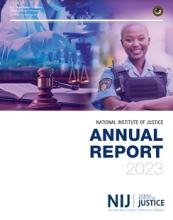Juvenile victims
Suggested Supports for Improving the Olweus Bullying Prevention Program’s Implementation and Impact in an Under-Resourced Middle School Context
Domestic Violence in the Lives of Children: The Future of Research, Intervention, and Social Policy
Out of home placement location and juvenile delinquency: The investigation of neighborhood impact on child welfare population's juvenile justice involvement
Prosecuting Child Physical Abuse Cases: A Case Study in San Diego
PERCEIVED AND ACTUAL RISKS OR SCHOOL-RELATED VICTIMIZATION: FINAL ACTIVITIES REPORT
Dual Vulnerability of Sexually Victimized Mothers and Sexually Victimized Children: A Longitudinal Study
Child Abuse, Neglect, and Violent Criminal Behavior: User's Guide to the Machine-Readable Files and Documentation and Codebook
Economy - Minnesota Community Corrections Act Evaluation
Long-Term Effects of Child Abuse and Neglect on Emotion Processing in Adulthood
YOUTHS' VICTIMIZATION EXPERIENCES, FEAR OF ATTACK OR HARM, AND SCHOOL AVOIDANCE BEHAVIORS: SUMMARY OF FINDINGS
National Institute of Justice Fiscal Year 2023 Annual Report
Decomposition of Juvenile-Sized Remains: a Macro- and Microscopic Perspective
Reproductive Coercion and Relationship Abuse Among Adolescents and Young Women Seeking Care at School Health Centers
Rates of Neglect in a National Sample: Child and Family Characteristics and Psychological Impact
Familial Pathways to Polyvictimization for Sexual and Gender Minority Adolescents: Microaffirming, Microaggressing, Violent, and Adverse Families
Intergenerational Transmission of Violence: The Mediating role of Adolescent Psychopathology Symptoms
The Effects of Adult Depression on the Recollection of Adverse Childhood Experiences
Human Trafficking Victimization Among Youth Who Run Away From Foster Care
Characteristics of Bias-Based Harassment Incidents Reported by a National Sample of U.S. Adolescents
Interpreting Short Tandem Repeat Variations in Humans Using Mutational Constraint
Victim Reports of Bystander Reactions to In-Person and Online Peer Harassment: A National Survey of Adolescents
Older Opposite-Sex Romantic Partners, Sexual Risk, and Victimization in Adolescence
De-escalation Training: What Works, Implementation Lessons, and Taking It to Scale; Plenary at the 2023 NIJ Research Conference
Police use of force, while infrequently used, is a tremendous concern to public safety in the United States when officers employ it excessively or inappropriately, causing injury or death and eroding public trust in law enforcement. This plenary from the 2023 NIJ Research Conference describes the Integrating, Communications, Assessment, and Tactics (ICAT) de-escalation training program developed by the Police Executive Research Forum to guide officers in defusing critical incidents.
See the YouTube Terms of Service and Google Privacy Policy



